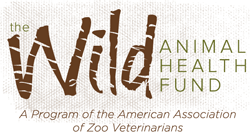Wild Animal Health Fund awards 13 grants for zoo animal, wildlife research

The Wild Animal Health Fund has awarded 13 grants for research on zoo animals and wildlife for 2018 totaling $105,407. The fund, in its seventh year, is a program of the American Association of Zoo Veterinarians.
Much advancement has taken place in veterinary medicine for domestic animals over the past century, according to the AAZV. Sources for research funding have included governments, the food animal and fiber industries, veterinary schools and other animal-related institutions, pharmaceutical companies, and, to a lesser extent, the public. But research funding for zoo animals and wildlife has not been abundant. Until the AAZV founded the Wild Animal Health Fund, only one other major funder supported research for these animals.
"The Wild Animal Health Fund is building a donor base of concerned citizens who are passionate about zoo animals and wildlife and understand the threats of mass extinction we are facing," according to the AAZV. "The Wild Animal Health Fund is growing in an effort to advance veterinary medicine for zoo animals and wildlife."
The new studies are in these areas:
- Diagnostic tools for African tree pangolins.
- Respiratory diseases in Bornean orangutans.
- Cardiac disease in marine mammals.
- Anthrax vaccine for use in wildlife.
- Disease risk assessment of pink pigeons.
- Lethal pathogens carried by invasive cane toads.
- Antimicrobial-resistance genes in wild seabirds.
- Lactate measurements in Quaker parrots.
- Health status of translocated Bolivian river dolphins.
- West Nile virus seroconversion in loggerhead shrikes.
- Relationship among microbiomes, pathogens, and host condition in African buffalo.
- Novel tuberculosis assay for African elephants.
- Nannizziopsis guarroi in companion lizards.
Related JAVMA content:
Zoo veterinarians, behind the scenes and in the field (July 15, 2017)